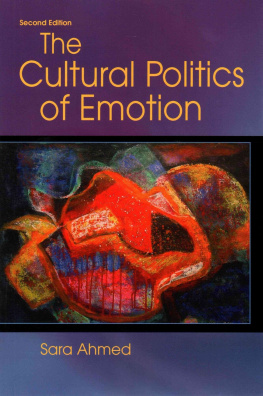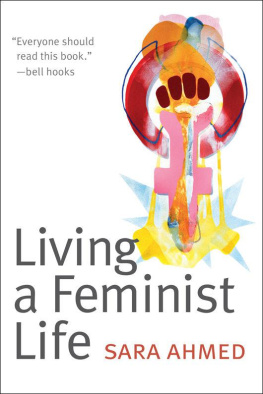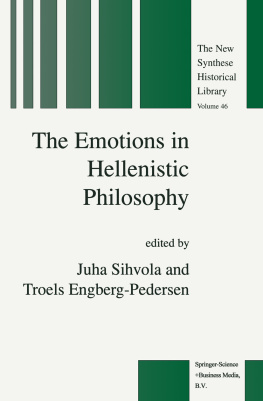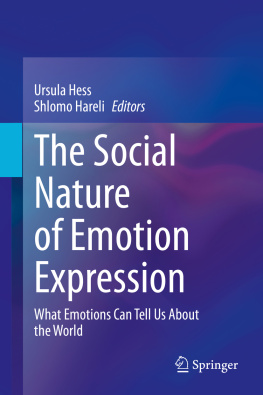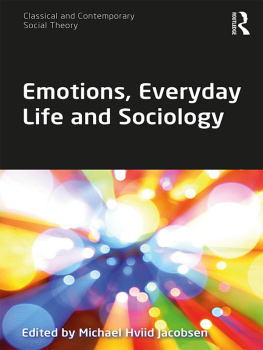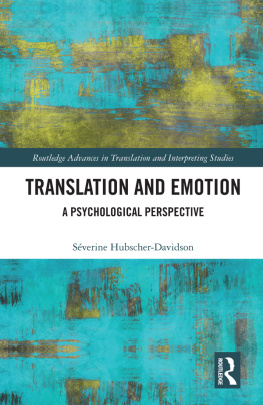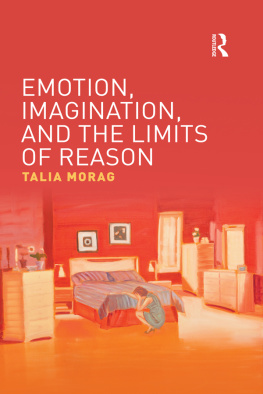The Cultural Politics of Emotion
The Cultural Politics of Emotion
SECOND EDITION
Sara Ahmed

Second edition published in the USA and Canada in 2015 by Routledge
711 Third Avenue, New York, NY 10017
Routledge is an imprint of the Taylor & Francis Group, an informa business
Second edition first published in the UK by Edinburgh University Press Ltd
2015 Sara Ahmed
All rights reserved. No part of this book may be reprinted or reproduced or utilised in any form or by any electronic, mechanical, or other means, now known or hereafter invented, including photocopying and recording, or in any information storage or retrieval system, without permission in writing from
the publishers.
First edition published in the USA and Canada by Routledge 2004
Library of Congress Cataloging-in-Publication Data
A catalog record has been requested
ISBN: 978-1-138-80503-3 (pbk)
Typeset in 11 on 13 pt Ehrhardt by
SNP Best-set Typesetter Ltd, Hong Kong, and
new material by Servis Filmsetting Ltd, Stockport, Cheshire
Printed and bound in Great Britain by
CPI Group (UK) Ltd, Croydon CR0 4YY
Contents
Acknowledgements
I wrote this book whilst I was co-director and then director of the Institute for Womens Studies at Lancaster University between 2000 and 2003. Thanks to all colleagues and students at Lancaster who helped me stay motivated during a challenging time, especially: Jackie Stacey (who shared the directorship with me for two years, and did much more than lighten the load); Rosemary Betterton; Claudia Castaeda; Alison Easton; Anne-Marie Fortier; Gerry Harris; Maureen McNeil; Lynne Pearce; Celia Roberts; Mimi Sheller; Vicky Singleton; Elaine Swan and Imogen Tyler. Thanks to Lauren Berlant whose visits to Lancaster generated much debate about feelings in public, from which I have greatly benefited. Thanks to Janet Hartley and Sandra Irving for continual and good-humoured support. My appreciation to Yuko Ogawo who gave me wonderful assistance in the preparation of the final manuscript and to Sarah Franklin, Nicole Vittelone, and Mimi Sheller who offered really helpful feedback on an earlier draft. Thanks to Jackie Jones for her excellent editorial advice throughout and her patience towards the end of the project. And my appreciation to Martha Elisa Bojrquez for kindly giving permission to use her beautiful art work for the cover.
I have been lucky to edit the book whilst on study leave in Australia. Thanks to the Arts and Humanities Research Board who funded this leave. I am very grateful to Elspeth Probyn and staff and students in the Department of Gender Studies, Sydney University, for providing such a stimulating environment in which to work. Thanks to my family, for being nearby in this past year, and for living under the sun. A special thanks to Sarah Franklin and Imogen Tyler for helping me change directions more than once.
Earlier versions of chapters have appeared as follows, and I thank publishers for permission to reprint here: (2001) The Organisation of Hate in Law and Critique 13 (3): 34565, with kind permission of Kluwer Academic Publishers; (2002) Contingency of Pain in Parallax 8 (1): 1734 (http://www.tandf.co.uk/journalsroutledge/13534645.html; (2003) The Politics of Fear in the Making of Worlds in International Journal of Qualitative Studies in Education 16 (3): 37798 (http://www.tandf.co.uk); (2003) Feminist Futures in M. Eagleton (ed.), The Concise Companion to Feminist Theory , Blackwell. Permission to quote from Bringing them Home was granted by the Human Rights and Equal Opportunity Commission, Australia.
Acknowledgements for the Second Edition
With thanks to Jackie Jones for suggesting and supporting a second edition of this book and to the editorial team at Edinburgh University Press for their help and efficiency. My appreciation to those with whom I have conversed about affect and emotion in the past decade including Lauren Berlant, Lisa Blackman, Kristyn Gorton, Sneja Gunew, Jin Haritaworn, Carolyn Pedwell, Elspeth Probyn, Divya Tolia-Kelly and Imogen Tyler. Thanks to my nownot-so-new colleagues at Goldsmiths for creating such a friendly and lively space to work; and to those who helped set up our new Centre for Feminist Research especially Sarah Kember, Angela McRobbie, Beverley Skeggs, and Natalie Fenton. And my heartfelt thanks to Sarah Franklin for travelling with me on this intellectual journey.
Introduction: Feel Your Way
Every day of every year, swarms of illegal immigrants and bogus asylum seekers invade Britain by any means available to them... Why? They are only seeking the easy comforts and free benefits in Soft Touch Britain. All funded by YOU The British Taxpayer! (British National Front Poster)
How does a nation come to be imagined as having a soft touch? How does this having become a form of being, or a national attribute? In The Cultural Politics of Emotion , I explore how emotions work to shape the surfaces of individual and collective bodies. Bodies take the shape of the very contact they have with objects and others. My analysis proceeds by reading texts that circulate in the public domain, which work by aligning subjects with collectives by attributing others as the source of our feelings. In this quote from the British National Front, the others, who are named as illegal immigrants and bogus asylum seekers, threaten to overwhelm and swamp the nation. This is, of course, a familiar narrative, and like all familiar narratives, it deserves close and careful reading. The narrative works through othering; the illegal immigrants and bogus asylum seekers are those who are not us, and who in not being us, endanger what is ours. Such others threaten to take away from what you have, as the legitimate subject of the nation, as the one who is the true recipient of national benefits. The narrative invites the reader to adopt the you through working on emotions: becoming this you would mean developing a certain rage against these illegitimate others, who are represented as swarms in the nation. Indeed, to feel love for the nation, whereby love is an investment that should be returned (you are the taxpayer), is also to feel injured by these others, who are taking what is yours.
It is not the case, however, that anybody within the nation could inhabit this you. These short sentences depend on longer histories of articulation, The narrative is addressed to white Aryans, and equates the vulnerability of the white nation with the vulnerability of the white body. YOU will not be soft! Or will you?
What is so interesting in this narrative is how soft touch becomes a national character. This attribution is not specific to fascist discourses. In broader public debates about asylum in the United Kingdom, one of the most common narratives is that Britain is a soft touch: others try and get into the nation because they can have a life with easy comforts. The British Government has transformed the narrative of the soft touch into an imperative: it has justified the tightening of asylum policies on the grounds that Britain will not be a soft touch. Indeed, the metaphor of soft touch suggests that the nations borders and defences are like skin; they are soft, weak, porous and easily shaped or even bruised by the proximity of others. It suggests that the nation is made vulnerable to abuse by its very openness to others. The soft nation is too emotional, too easily moved by the demands of others, and too easily seduced into assuming that claims for asylum, as testimonies of injury, are narratives of truth. To be a soft touch nation is to be taken in by the bogus: to take in is to be taken in. The demand is that the nation should seal itself from others, if it is to act on behalf of its citizens, rather than react to the claims of immigrants and other others. The implicit demand is for a nation that is less emotional, less open, less easily moved, one that is hard, or tough. The use of metaphors of softness and hardness shows us how emotions become attributes of collectives, which get constructed as being through feeling. Such attributes are of course gendered: the soft national body is a feminised body, which is penetrated or invaded by others.
Next page
